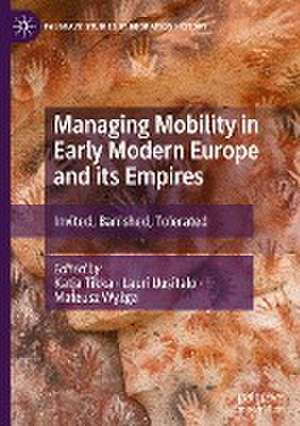Managing Mobility in Early Modern Europe and its Empires: Invited, Banished, Tolerated: Palgrave Studies in Migration History
Editat de Katja Tikka, Lauri Uusitalo, Mateusz Wyżgaen Limba Engleză Hardback – 17 dec 2023
This book examines how migration and mobility were controlled, supported, and restricted in early modern Europe and European colonies. The aim of the book is to investigate how different actors, such as rulers, regional lords, local authorities, and corporations tried to regulate different forms of mobility and how those on the move reacted to these attempts. The book examines the agency of both the authorities and the migrants, shifting focus between the macro and the micro level. The chapters will also illuminate the ways gender, religion, language, ethnicity, occupation, and socioeconomic status were entangled in the regulations concerning mobility. Control of migration is inextricably linked with power relations. In this book, mobility is seen as a wide social process, which covers daily or seasonal movement as well as less or more stable migration.
Preț: 727.31 lei
Preț vechi: 886.97 lei
-18% Nou
139.17€ • 145.67$ • 115.83£
Carte tipărită la comandă
Livrare economică 31 martie-14 aprilie
Specificații
ISBN-10: 3031418883
Ilustrații: XIII, 225 p. 12 illus., 4 illus. in color.
Dimensiuni: 148 x 210 mm
Greutate: 0.44 kg
Ediția:1st ed. 2023
Editura: Springer Nature Switzerland
Colecția Palgrave Macmillan
Seria Palgrave Studies in Migration History
Locul publicării:Cham, Switzerland
Cuprins
Chapter 1: Introduction - Katja Tikka and Mateusz Wyżga.- Part I: Economy Behind the Mobility.- Chapter 2: From Foreign Mercenaries to the King’s Trusted Companions - Emergence of the Swedish-Scottish Recruitment Network 1556-1610-Jaakko Björklund and Sebastian Schiavone.- Chapter 3: Early Swedish Trading Companies - Shortcut to Migration?-Katja Tikka.- Chapter 4: ‘Notoriously and publicly known to the stock exchange’: Private initiatives in early modern Amsterdam to ransom and repatriate Barbary captives-Tessa de Boer and Jirsi Reinders.- Part II: Islands, Peripheries, and Colonies.- Chapter 5: Multiethnic Islands in the Middle of Indigenous Lands: Native Migration to the Colonial Towns in the Northern Andes, 1550–1650-Lauri Uusitalo.- Chapter 6: Not Wanted on the Island? Managing Outlanders in Early Modern Iceland-Katelin Marit Parsons.- Part III: Empires – Regulation and Control.- Chapter 7: Liquid identity? Peasants’ mobility and migration policies in the Polish-Lithuanian Commonwealth in the seventeenth century. The case of the microregions of Gdańsk and Cracow-Mateusz Wyżga and Jaśmina Korczak-Siedlecka.- Chapter 8: One does not simply walk out of Sweden: Early Modern regulations and conceptualizations of migration-Martin Andersson.- Chapter 9: Between the Abolition of Serfdom and Servitude: The control of mobility and migrations of rural population conducted by manorial officers on behalf of the Habsburg Monarchy and its army (South Bohemia – Třeboň Estate during the Napoleonic Wars)-Josef Grulich.- Chapter 10: Concluding Remarks-Lauri Uusitalo.
Notă biografică
Katja Tikka is a legal historian and postdoctoral researcher at the University of Helsinki, Finland. Her research focuses on early modern Nordic legislation in different fields and societies. Tikka also teaches legal culture at the University of Lapland, Finland as a visiting teacher.
Lauri Uusitalo is a postdoctoral researcher in the Unit of History, Philosophy and Literary Studies at Tampere University, Finland. His research explores the history of early colonial Spanish America, and in particular, indigenous agency in the colonial society.
Mateusz Wyżga is Associate Professor in the Institute of History and Archival Studies at the University of the National Education Commission, Krakow, Poland. His research focuses on the history of mobility and migration, rural history, the socio-economic history of the sixteenth to the eighteenth centuries, and historical demography. He is also interested in social archival studies and regional historiography.
Textul de pe ultima copertă
This book examines how migration and mobility were controlled, supported, and restricted in early modern Europe and European colonies. The aim of the book is to investigate how different actors, such as rulers, regional lords, local authorities, and corporations tried to regulate different forms of mobility and how those on the move reacted to these attempts. The book examines the agency of both the authorities and the migrants, shifting focus between the macro and the micro level. The chapters will also illuminate the ways gender, religion, language, ethnicity, occupation, and socioeconomic status were entangled in the regulations concerning mobility. Control of migration is inextricably linked with power relations. In this book, mobility is seen as a wide social process, which covers daily or seasonal movement as well as less or more stable migration.
Katja Tikka is a legal historian and postdoctoral researcher at the University of Helsinki, Finland. Her research focuses on early modern Nordic legislation in different fields and societies. Tikka also teaches legal culture at the University of Lapland, Finland as a visiting teacher.
Lauri Uusitalo is a postdoctoral researcher in the Unit of History, Philosophy and Literary Studies at Tampere University, Finland. His research explores the history of early colonial Spanish America, and in particular, indigenous agency in the colonial society.
Mateusz Wyżga is Associate Professor in the Institute of History and Archival Studies at the University of the National Education Commission, Krakow, Poland. His research focuses on the history of mobility and migration, rural history, the socio-economic history of the sixteenth to the eighteenth centuries, and historical demography. He is also interested in social archival studies and regional historiography.
Caracteristici
Offers insights into the historical roots of modern migration policies and society's response to them
Provides perspectives for those researching gender, colonialism and indigenous history














